- Bernard Preston homepage
- Easy Soup
- Allicin Benefits
Allicin benefits
Allicin benefits are to be found in the onion-family, particularly in garlic but also in leeks.
The allium family of vegetables of course add immeasurably to the taste of our food; just as important they have many proven nutritional-benefits.
Just how they work to prevent metastatic conditions, reduce heart disease and act as an anti-microbial agent is still being researched; but we do not have to wait for these mechanisms to be defined. We can start enjoying them in abundance right now.
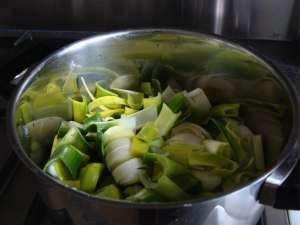
Bernard Preston updated this page on allicin benefits on 9th April, 2024.
Chemically speaking allicin is an organic compound with two sulphur-atoms. That is what gives garlic its pungent aroma.
It is released as a volatile gas that dissolves in the tears in our eyes, releasing tiny amounts of sulphuric-acid which causes the itching and burning.
However it breaks down very quickly in cooking so it is best to add garlic just before serving.
You can spend quite a lot of money on various powders and capsules; but why not just add leeks, spring onions and shallots to your food on a daily basis? The taste is simply amazing. Sparkling well-being comes from enjoying these nourishing herbs, not from taking them in tablet form.
Growing leeks and onions is for those with large gardens but small patches of shallots and chives are for everyone. Just pluck off a couple green-shoots every day for the salad. They have such a wonderful flavour.
They are also a good source of potassium and vitamin-C too; help for hypertension.
Notice the two sulphur-atoms.
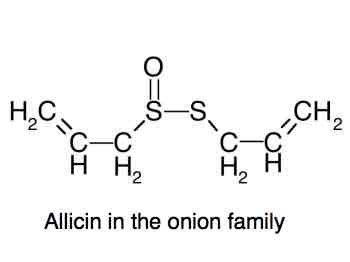
Allicin benefits
You might like to read this article in a medical journal which reviews the tumour prevention of allicin in certain vegetables but in short they also report anti-microbial properties and reducing clots; lowering of cholesterol, stabilising arthritis and blood sugar too. In short a host of wonderful resources[1]. There is not one person reading this who would not benefit from enjoying the onion family daily.
Nevertheless they admit that the mechanisms by which allicin and other flavonoids in this family work in producing these amazing benefits are still speculative. That need not stop us from enjoying garlic, spring onions and chives on a daily basis.
I find it very scary that oncologists are now saying it is no longer a question of if you will get a metastatic-disease but when the dreaded lurgy will strike.
The suggestion is that almost no one will escape.
Allicin is a labile substance; it breaks down very quickly when exposed to light and heat. Once extracted from garlic or leeks, it loses its potency within hours.
Growing leeks
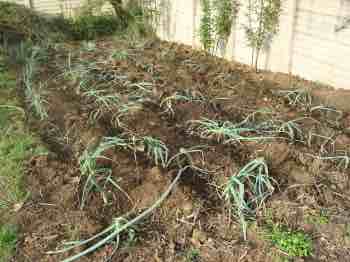
Roll on the allicin benefits and for those with the time and inclination, growing leeks for example is not rocket-science.
It took me only an hour yesterday to plant out these leeks. Within a couple-months we will be enjoying them on a daily basis.
It is five-years since I first planted out leek seedlings. Now there are clumps of them all over the vegetable garden where they also reduce infestation by various bugs.
It is of course anecdotal but I strongly believe that it is largely because of the protection that flavonoids like allicin bring to our wellness that both my wife and I enjoy a life without medication; despite being midway through our eighth-decade.
Yes gardening and walking also contribute to our physical strength and well-being. Last week we hiked the Whale Trail in South Africa, a distance of forty miles in five days over very rough terrain.
We enjoy allicin benefits every morning in Eggs Hilton, our variation of the great Florentine dish. Satiety is the word; it stays with you for the whole day. There is no need to snack at 11 o'clock and it causes no surge in blood glucose as a more traditional cereal breakfast would; particularly if there is added sugar. That is what makes folk insulin resistant and obese. Why is whole grain better is a question you may be asking.
Folk complain of little time to prepare their food in the morning. Either we make thirty minutes or so, or we will be spending a lot more hours consulting the oncologist and heart specialist; and taking bucket-loads of pills.
The alternative is one of these smoothies; in five minutes you have a nutritious low carb satiating breakfast.
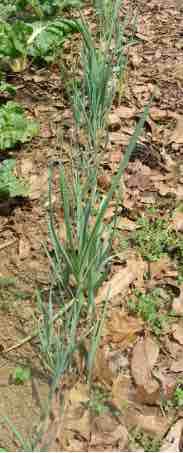
Plant your sprouting onions and you will find them equally delicious, especially the greens in a salad.
Quercetin
Bioflavonoids help prevent inflammation, hence the interest of this DC; and act as a antioxidants.
Every time you buy french fries, cooked in old oil high in oxidised low-density cholesterol, dangerous free oxygen radicals are released; so we need the protection yielded by nutrients in the allium family.
This is why the quercetin in onions is recognised for its anti-tumour effect.
Eating onions daily has been shown to lower the incidence of many tumours particularly of the GI tract but also the ovaries, for example.
Allicin benefits are to be found in the sorts of foods we should be enjoying on a daily basis if we have no desire to get metastatic disease; couldn't be bothered perhaps? Those who will not hear, must feel is a profound Dutch saying.
Osteoporosis
Broken bones are obviously common in the elderly. Swiss researchers found that daily onion consumption by reducing osteoporosis was associated with a 20% lower incidence of hip-fracture.
That alone makes allicin benefits from our food on a daily basis critical for every woman.
Diabetes
Onions are a good source of quercetin and chromium, an element associated with better regulation of insulin. Together with sulforaphane from crucifers they make an excellent combination in the management of diabetes.
Anti-clot formation
Another of the many allicin benefits is a proven platelet-regulating property; they improve the lining of blood vessels, lessening strokes and heart attacks.
The allium family has many members; have fried onions with your eggs Florentine for breakfast, shallots and chives with your green salad at lunch, and plenty of garlic in that beef-stew tonight.
Do you know what the symptoms of a heart-attack are? We should all know them cold.
Choice foods
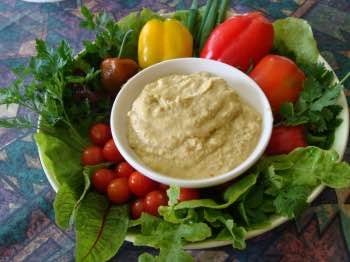
The allium family certainly is one of the all-time choice foods, so easy to cook and adds immensely to any meal, raw, fried or stewed. The tiny spring onions chopped into our daily green salad makes such a difference to what could otherwise be a rather dull dish.
Chopping onions
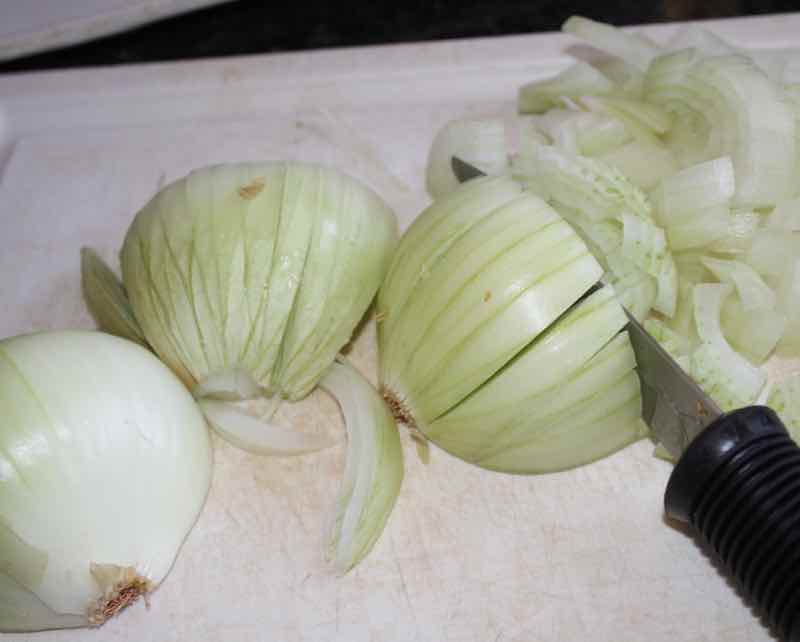
The key to chopping onions is to work quickly to save your eyes from that acid. Cut it in half lengthways, slicing off the head, but leaving the root end intact. Make incisions all along the round of the bulb, but leaving the whole intact; this helps prevent the release of the noxious sulphurous-gases.
Now turn your half-onion sideways and slice it, holding onto the root, and starting at the head end; that gives you nice little cubes and minimal pain in your eyes.
These important volatile gases will soon be lost; chop your onions just before cooking.
Never buy chopped onions from the supermarket; you will lose much of their flavour and nutrient-value.
So whether it is vichyssoise, a mutton stew or simply finely chopped raw onion on a hamburger, the allicin benefits are vast and I suspect largely under-reported, and at this stage not easily measured.
Do not forget the garlic either. That goes into our Eggs-Florentine every morning, the hummus at lunch and usually finds its way into the main dinner dish in one way or another.
Just eat more onions if you want to be less ill.
Bernard Preston
Bernard Preston is crazy about simple, definitely not cordon-bleu, nutritious food. Stuff that tastes great, does wonders for your mind and body and can be prepared in a jiffy; the allicin benefits in the onion family are a case in point.
When browsing use right click and "Open Link in New Tab" or you may get a bad gateway signal.
Newsletter
Our newsletter is entitled "create a cyan zone" at your home, preserving both yourself and Mother Earth for future generations; and your family too, of course. We promise not to spam you with daily emails promoting various products. You may get an occasional nudge to buy one of my books.
Here are the back issues.
- Lifestyle and ideal body weight
- What are ultra-processed foods?
- Investing in long-term health
- Diseases from plastic exposure
- Intensive lifestyle management for obesity has limited value
- A world largely devoid of Parkinson's Disease
- The impact of friendly bacteria in the tum on the prevention of cancer
- There's a hole in the bucket
- Everyone is talking about weight loss drugs
- Pull the sweet tooth
- If you suffer from heartburn plant a susu
- Refined maize meal and stunting
- Should agriculture and industry get priority for water and electricity?
- Nature is calling
- Mill your own flour
- Bake your own sourdough bread
- Microplastics from our water
- Alternative types of water storage
- Wear your clothes out
- Comfort foods
- Create a bee-friendly environment
- Go to bed slightly hungry
- Keep bees
- Blue zone folk are religious
- Reduce plastic waste
- Family is important
- What can go in compost?
- Grow broad beans for longevity
- Harvest and store sunshine
- Blue zone exercise
- Harvest and store your rainwater
- Create a cyan zone at your home
Did you find this page interesting? How about forwarding it to a friendly book or food junkie? Better still, a social media tick would help.
- Bernard Preston homepage
- Easy Soup
- Allicin Benefits
Address:
56 Groenekloof Rd,
Hilton, KZN
South Africa
Website:
https://www.bernard-preston.com